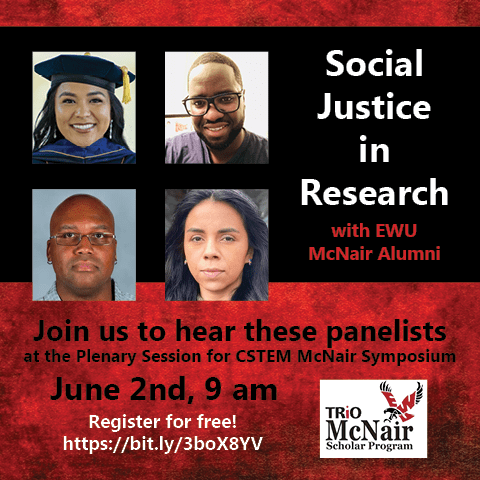
McNair is a federally funded TRIO program intended to diversify academia by providing support to low income and first-generation students and/or students racially underrepresented in higher education on their path towards attaining a PhD. To date 41 EWU McNair alumni have gone on to earn their PhD and many are currently in graduate school getting closer to that goal. Our scholars are doing incredible work in their communities, both in school and once they’ve earned their degree. They are also making powerful change in academia. One piece of this is rethinking and implementing research practices that are more liberatory and whose aim is to create a more just world.
We are honored to have EWU McNair Alumni Dr. Laura Zamudio-Orozco, Dr. Frank C. King Jr., Dr. Yvonne Sherwood, and Dr. S. Omar Jobe join us for a panel on “Social Justice in Research” facilitated by EWU McNair Directora Dra. Christina Torres Garcia. This year EWU McNair and CSTEM collaborated to host a research symposium to ensure undergraduate students had the opportunity to present their research. This panel will be the plenary session kicking off the symposium at 9 am on June 2nd.
Click here to register for the free “Social Justice in Research” panel on June 2nd at 9 am!
The panelists have a wide range of research, including Afrocentric philosophy, Indigenous Feminism, Mathematics education, and medical devices. We were fortunate enough to talk with panelists in advance of the session where they shared some of their insights on the topic. EWU McNair Alumna Dr. Zamudio-Orozco, who earned her PhD in Mathematics Education and is now an Assistant Professor and the McNair Program Director at Heritage University, says, “I see research as a tool to work with our multiple communities to highlight social injustices and issues that we are facing and also to highlight the strength and knowledge in our communities.”
Dr. Jobe, Senior Manager in Medical Science Liaison at Edwards Lifesciences, relates what social justice looks like in his field of medical research. “Far too often, gross inequities mean that some groups succumb to disease and death disproportionately, while others’ advantages protect them, due to disparities in health care provision, political persecution, social strife, racial discrimination, and a plethora of other factors. My company makes medical devices for structural heart diseases and social justice in that sense means I have to do everything in my power to make sure our research and clinical trials represent the make up of the country and our devices are accessible and affordable to all.”
In addition, panelists were asked about how to be a good mentor and how to take the most advantage of research as a student. Dr. King, Executive Director of Diversity, Equity, and Inclusion at the University of Wisconsin-Platteville and a Program Coordinator for Ethnic Studies, advises “Remember that it is the student’s project. We have to find a way to help the student find their voice. We can challenge them. We can maybe even say how difficult or impossible the topic will be. But we have to let them find their way.”
Dr. Sherwood, Assistant Professor at the University of Toronto, Mississauga, shares this insight for students involved in research: “Read: Critical Mentoring: A Practical Guide by Torie Weiston-Serdan. Find strength in knowing you (and your community) are not the deficit despite that much of the dominant narrative places us (marginalized and racialized communities) as needing to be “saved” by schooling and mentorship. You are our strength. Trust yourself and trust your network.”
To hear more from these outstanding and insightful panelists, join us for the panel and click on their name above to read the full pre-panel interview with each candidate. You can register for free to attend this amazing discussion.

